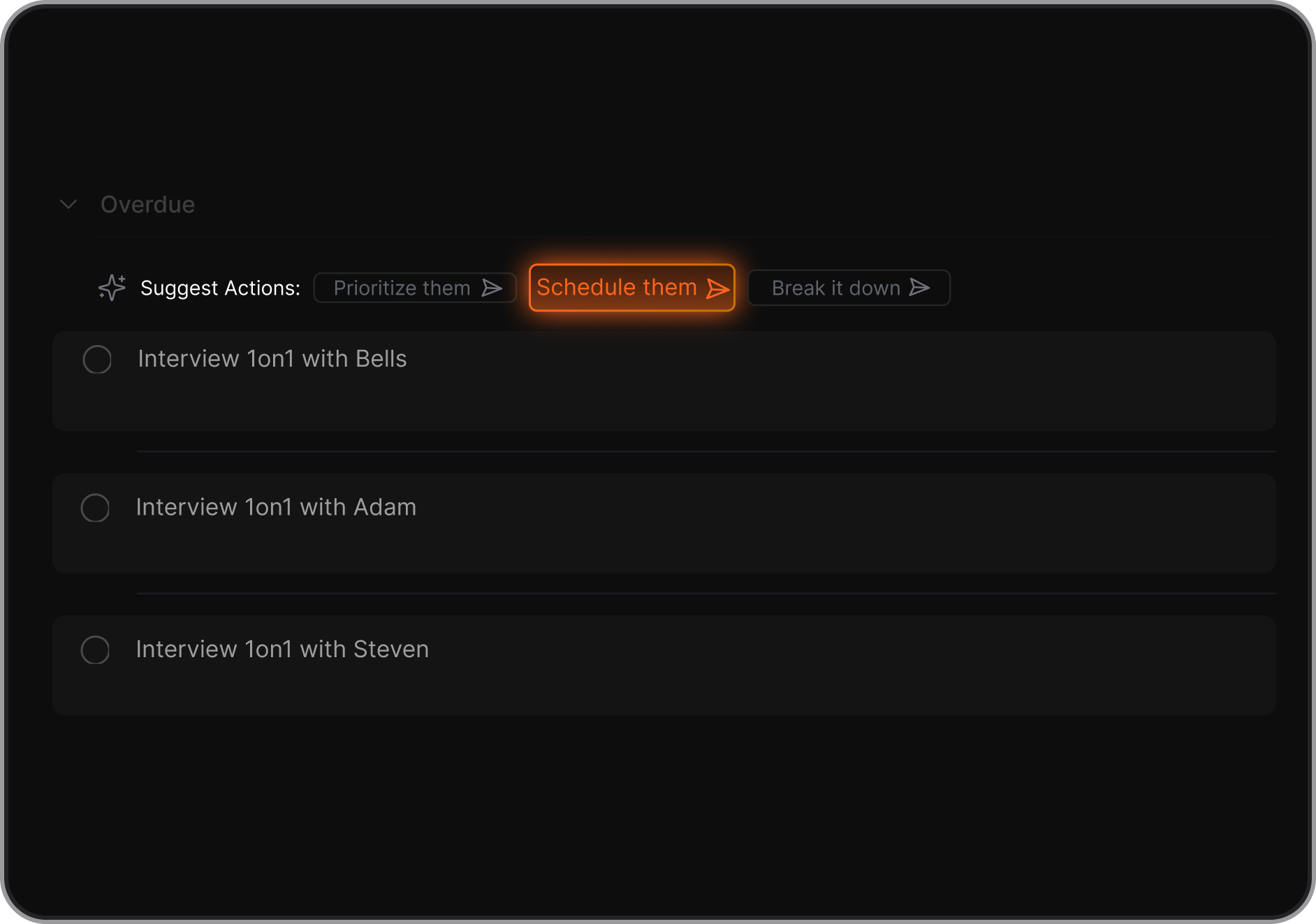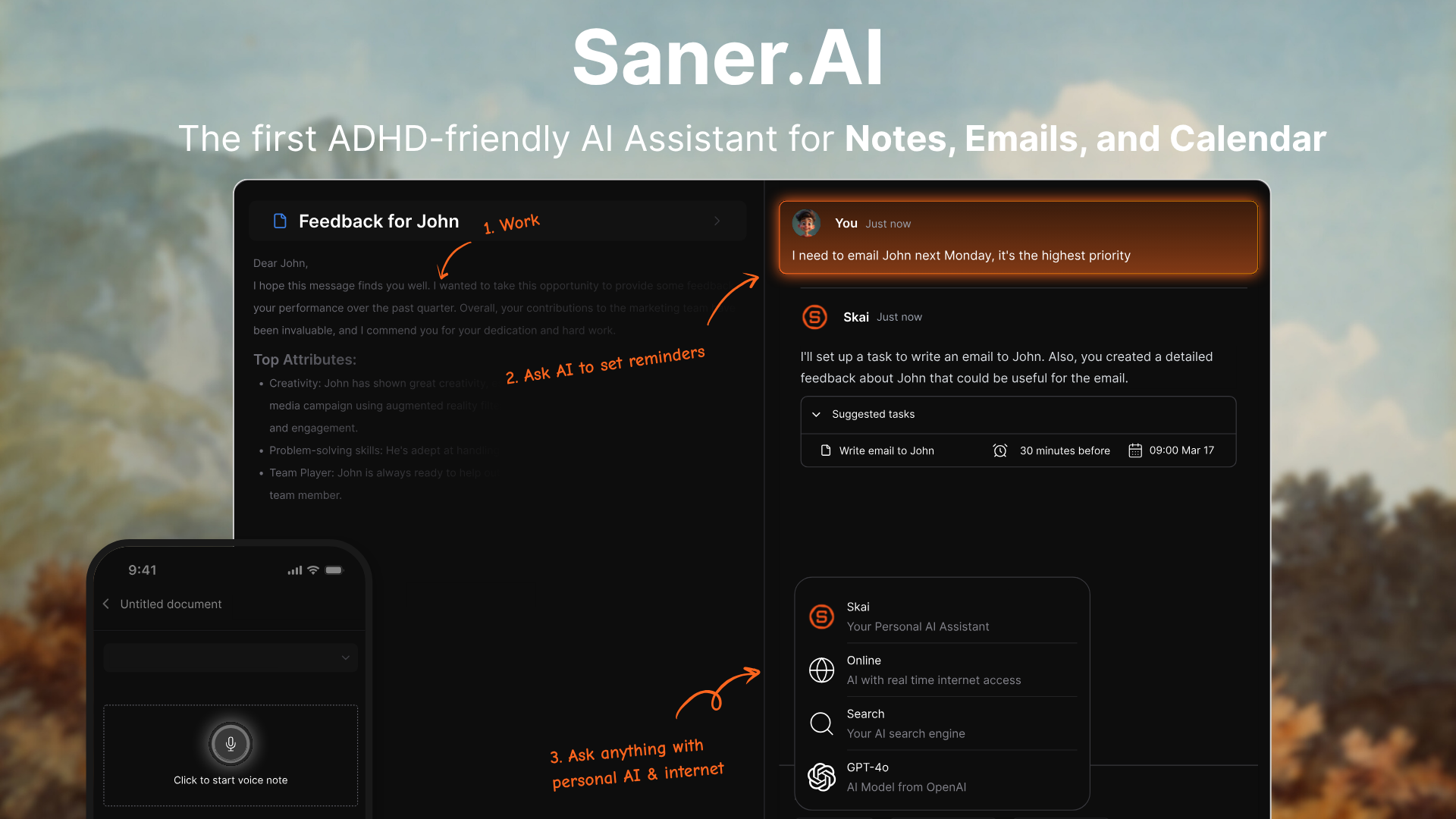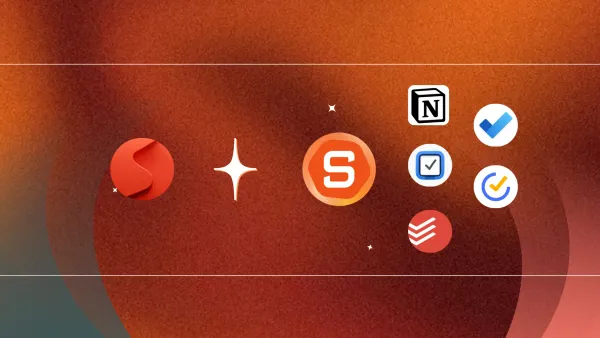How to Set Daily Goals (+ 100 Aspiring Examples )

Introduction: Why Daily Goals Matter
Daily goals might seem small, but they’re one of the most powerful tools for building momentum in life and work. When your days have a clear direction, your weeks become productive, and over time, your big-picture goals start falling into place.
When you turn this into a daily habit - focusing on small, achievable wins- you create a system for steady progress. Each daily goal becomes a stepping stone toward your long-term vision, while also giving you the sense of accomplishment that keeps your motivation alive.
Whether you're a busy professional, a student juggling deadlines, or someone with ADHD trying to stay on track, daily goals offer structure, clarity, and motivation. They reduce overwhelm, provide quick wins, and build the kind of consistency most people struggle to maintain.
In this guide, we’ll break down exactly how to set effective daily goals and help you avoid common mistakes. And to make it super practical, we’ve included 100 daily goal examples across topics - from productivity to fitness to ADHD-friendly focus hacks.
Let’s help you start each day with purpose - and finish it with pride
What Are Daily Goals?
Daily goals are small, specific outcomes you aim to achieve within a single day. They give your day structure and help you focus on what matters most.
Here’s how they compare to other planning tools:
- Daily goals vs. long-term goals:
Long-term goals are visions for the future (e.g., “write a book”), while daily goals break them down into manageable chunks (e.g., “write 300 words today”). - Daily goals vs. to-do lists:
A to-do list might include errands, reminders, or random tasks. Daily goals are intentional; they’re about progress and purpose, not just checking boxes.
Think of daily goals as micro-wins that move you toward your bigger aspirations.
Why Daily Goal Setting Works (Psychology & Productivity)
Science backs the power of daily intention-setting. Here’s why it works:
- Intention setting: Research shows that consciously deciding what you want to accomplish increases follow-through. When you say, “Today I will [goal],” your brain treats it as a mission.
- Cognitive offloading: Writing down your goals clears mental clutter. You don’t have to remember everything - your brain can focus on doing instead of tracking.
- Reduces decision fatigue: By setting goals in advance, you avoid the “what should I do next?” spiral. This frees up mental energy for execution.
- Creates positive reinforcement: Checking off a goal gives you a dopamine hit. That tiny reward builds habit strength over time.
If you’ve ever ended a day feeling busy but not accomplished, daily goals are your fix.
How to Set Daily Goals Effectively
✅ Step-by-Step Framework
- Start with a focus area
- Choose 1–2 life domains: work, health, learning, family, etc.
- Ask: “What do I want to move forward today?”
- Set SMART or CLEAR goals
- SMART = Specific, Measurable, Achievable, Relevant, Time-bound
- CLEAR = Collaborative, Limited, Emotional, Appreciable, Refinable
- Keep it achievable
- Aim for goals you can complete in one day.
- Use action verbs: write, walk, finish, clean, read.
- Prioritize 1–3 key goals
- Too many goals = diluted focus.
- Pick the ones that’ll move the needle.
- Time-block or anchor to habits
- Schedule your goals (e.g., “9–10 AM: Deep work session”).
- Or stack them with routines (e.g., journal after brushing teeth).
- Reflect at the end of the day
- Ask: What did I complete? What distracted me?
- Adjust tomorrow’s goals accordingly.
🔁 Pro tip: Use the same time each morning or evening to set goals—it makes it a habit.
Common Mistakes to Avoid
Avoid these pitfalls to make your daily goal-setting stick:
- ❌ Setting too many goals
More than 3 major goals? You’ll likely finish none. Focus beats volume. - ❌ Being vague
“Be healthier” isn’t a goal. “Do a 15-minute yoga session” is. - ❌ Not scheduling them
Goals without time blocks often get pushed aside by busywork. - ❌ Skipping reflection
Without feedback, your goals don’t improve. Take 2 minutes to review daily. - ❌ Ignoring bigger priorities
Daily goals should tie into weekly or monthly themes. Don’t just chase what’s urgent.
100 Aspiring Daily Goal Examples (By Topic)
Productivity / Work (15 Examples)
- Write one page of a report or article
- Block 1 hour for deep work on the priority project
- Follow up with 3 leads or clients
- Organize your top 5 digital files
- Clear your email inbox to zero
- Outline your weekly plan
- Create tomorrow’s task list
- Review your top 3 goals for the quarter
- Batch-schedule social media posts
- Take 10 minutes to declutter your desk
- Give feedback on 1 colleague’s project
- Schedule one networking call
- Automate one recurring task
- Complete one overdue task
- Track how you spent your time today
Fitness / Health (15 Examples)
- Do a 20-minute bodyweight workout
- Drink 8 cups of water
- Prep a healthy lunch
- Go on a 30-minute walk
- Track your calories or macros
- Stretch for 10 minutes after work
- Get 7–8 hours of sleep
- Take vitamins or supplements
- Do 10 push-ups every hour
- Try a new healthy recipe
- Meditate after your workout
- Do a YouTube yoga session
- Take the stairs all day
- Avoid sugar for 24 hours
- Walk 10,000 steps
Mental Health / Mindfulness (10 Examples)
- Journal 3 things you’re grateful for
- Do a 10-minute meditation
- Take a midday break outdoors
- Practice a breathing exercise
- Write down 1 positive affirmation
- Reflect on what went well today
- Text someone you appreciate
- Listen to calming music for 15 minutes
- Go tech-free for 30 minutes
- Set 1 boundary for your energy
Learning / Personal Development (15 Examples)
- Read 10 pages of a nonfiction book
- Watch a 20-minute educational video
- Take notes on a podcast episode
- Practice a new language for 15 minutes
- Highlight key takeaways from a chapter
- Write a LinkedIn post about what you learned
- Study one concept from an online course
- Do 1 creative writing exercise
- Review your notes from yesterday
- Teach someone what you learned
- Review a saved article or thread
- Learn 5 new vocabulary words
- Update your personal website or bio
- Reflect on your strengths or skills
- Write a question you want to explore
Students / Study Goals (15 Examples)
- Review flashcards for 15 minutes
- Finish one assignment or draft
- Attend or rewatch one lecture
- Organize your study materials
- Summarize one chapter in your own words
- Study for 45 minutes using Pomodoro
- Email a professor with a question
- Review tomorrow’s schedule
- Join a study group session
- Rewrite your notes from class
- Use a study app for 10 minutes
- Do a practice quiz
- Update your planner
- Check off one module from your course
- Outline an essay or paper
Entrepreneurs / Side Projects (10 Examples)
- Update your website or landing page
- Publish a tweet or post to build in public
- Test one marketing idea
- Review your key metrics
- Reach out to 1 potential collaborator
- Record a short video or voice memo
- Fix 1 bug or issue
- Write part of your business plan
- Research a competitor or trend
- Set a daily revenue or traffic target
Parents / Family Life (5–10 Examples)
- Plan a fun 30-minute activity with your child
- Prep meals for the next day
- Declutter 1 area of the house
- Have a “no phones” dinner
- Check in with your partner or co-parent
- Set up tomorrow’s school prep
- Do a 5-minute tidy-up together
- Write a note or letter to your child
- Call or visit a relative
Creative Projects (10 Examples)
- Draw or sketch for 20 minutes
- Take one photo and edit it
- Write a short poem or lyric
- Brainstorm 10 ideas for a project
- Add 100 words to your novel
- Record a short music loop
- Create a Pinterest mood board
- Design one Canva graphic
- Revisit an old creative piece
- Publish something imperfect
Household / Admin (5–10 Examples)
- Pay one bill
- Organize one drawer or shelf
- Clean the kitchen counter
- Update your budget
- Cancel one unused subscription
- Back up your phone or files
- Schedule a doctor or service appointment
- Clean up your desktop folders
ADHD / Focus-Friendly (10 Examples)
- Write your 3 goals on a sticky note
- Use a timer for 25 minutes of focus
- Take a 5-minute movement break every hour
- Eliminate 1 digital distraction
- Do a brain dump of tasks
- Prep your bag or tools the night before
- Schedule one “white space” hour
- Use visual cues to start your task
- Try body doubling with a friend
- End the day by celebrating 1 win
Daily Goal Template (Printable or Reusable Framework)
Use this simple layout to plan your day:
| Focus Area | Goal | Time Block | Status |
|---|---|---|---|
| Work | Write 300 words | 9–9:30 AM | ✅ Done |
| Health | 20-minute yoga | 6 PM | ⬜ Not Yet |
| Learning | Watch 1 lesson from coding course | 8 PM | ⬜ Not Yet |
You can create your own version in a notebook, planner, or use tools like Notion, Google Docs, or a printable sheet.
🧠 How Saner.AI Helps You Set and Stick to Daily Goals
If you’ve ever opened your laptop and thought, “What should I even start with today?” - Saner.ai has your back.
✨ Your AI Daily Planner
Every morning, Saner.AI automatically scans your emails, calendar events, to-dos, and notes to create a personalized, optimized day plan. It pulls context from all your tools to help you decide what truly matters today, not just what’s urgent.

Whether you’re managing a business, studying for finals, or trying to stay focused with ADHD, Saner acts like a thinking partner who lays out your priorities before the day begins.
✅ Bonus: You can ask the AI questions like,
“What are my top 3 priorities today?” or
“Do I have time for a deep work session?”—and it answers with full context.
🔄 Live Check-Ins Throughout the Day
Unlike static to-do apps, Saner checks in with you during the day to help you stay on track. If you get sidetracked, it gently nudges you back toward your goals, helping you course-correct in real time.
- Midday slump? Saner might ask: “Do you still want to work on your writing sprint?”
- Schedule change? It adapts your day plan instantly.
- Unexpected win? It helps you log the progress and shift your next steps.
This makes it especially valuable for people who struggle with executive function or context switching, because Saner does the switching for you.
🔁 Turns Long-Term Goals into Daily Actions
Have a big personal or professional goal? Just type it into Saner, and it will help you break it down into daily, doable steps.
You can plan by category (like work, health, creative projects), and Saner will weave those priorities into your daily routine, without overwhelming you.

🧠 Built for ADHD Brains, Loved by Busy Minds
Designed by people with ADHD, Saner.AI eliminates overwhelm with features like:
- Focus Mode: One task, full screen, no distractions
- Smart summaries of your tasks, ideas, and priorities
- Real-time suggestions and reminders that don’t interrupt flow
In Short: Saner.AI Helps You…
| ✅ Feature | 🧩 How It Helps With Daily Goals |
|---|---|
| Daily plan generation | Gives you a clear, optimized starting point every day |
| Email + calendar scan | Surfaces the real priorities, not just noisy tasks |
| Real-time check-ins | Keeps you focused and flexible throughout the day |
| Goal breakdown engine | Turns big goals into small, daily wins |
| ADHD-friendly design | Reduces distractions and cognitive overload |
Set and Achieve your Daily Goals effortlessly
FAQ: How to Set Daily Goals
1. What does it mean to set daily goals?
Setting daily goals means deciding what specific things you want to get done today. These aren’t vague wishes - they’re clear, actionable steps that move you forward.
Think of daily goals like a to-do list with intention. Instead of just reacting to emails or meetings, you’re proactively shaping your day.
2. Why is it important to set daily goals?
Daily goals help you:
- Stay focused on what matters
- Avoid overwhelm by breaking big goals into bite-sized actions
- Feel a sense of progress, even on chaotic days
Without them, it’s easy to stay busy all day but end up wondering what you actually accomplished.
3. How to set daily goals effectively?
Here’s a simple 3-step method:
- Start with your big picture. What are your weekly or monthly goals?
- Break it down. Choose 1–3 priorities that move those bigger goals forward.
- Add supporting tasks. What small steps will help you succeed today?
Bonus tip: Set your daily goals the night before or first thing in the morning. That way, you start with purpose, not distraction.
4. How many daily goals should I set?
Most people get the best results by setting 1–3 high-impact goals each day.
Too many goals = scattered focus.
Too few = missed opportunity.
If you finish early, you can always add more. But starting with too much often leads to frustration and burnout.
5. What are examples of good daily goals?
Here are some clear, actionable daily goal examples:
For Work:
- Write the first draft of the Q3 proposal
- Follow up with 5 potential clients
- Prepare slides for Monday’s team meeting
For Personal Growth:
- Meditate for 10 minutes
- Read 20 pages of a nonfiction book
- Write in my journal for 15 minutes
For Health:
- Walk 6,000 steps
- Cook a healthy dinner
- Stretch before bed
Each goal is specific, achievable, and measurable.
6. What are examples of daily goals for students?
Here are study-focused daily goals examples:
- Finish the outline for my essay
- Review chapters 3–4 before tomorrow’s quiz
- Study flashcards for 20 minutes
Simple, time-bound goals help students avoid last-minute stress and build momentum.
7. What are the daily goals for ADHD?
For ADHD minds, simplicity and clarity are key:
- Clear 3 emails from my inbox
- Write one paragraph for my blog
- Take a 10-minute walk after lunch
Use checklists, reminders, and tools like Saner.AI to keep your brain on track, without overloading it.
8. Should I write my daily goals down?
Yes. Writing daily goals:
- Makes them real
- Helps you stay focused
- Gives you a sense of accomplishment when you check them off
You can use paper, a planner app, or even a Personal GPT like Saner.AI to set and review your goals each day.
9. When’s the best time to set daily goals?
Most productive people set their goals:
- At night, Reflect on the day and plan tomorrow
- In the morning, Start fresh with clear intentions
Choose the time that fits your rhythm, but make it a habit.
10. What tools can help me set daily goals?
You don’t need fancy tools, but they can help. Some options:
- Paper planner: Simple and satisfying
- To-do apps (like Todoist or Notion): Great for checklists
- AI tools like Saner.AI: Understands your goals, tasks, and notes, then helps you stay on track with smart reminders and natural language planning
11. How do I stay consistent with setting daily goals?
Start small. Build the habit. Here's how:
- Set a daily reminder to review your goals
- Keep it simple, just 1 to 3 items to start
- Celebrate small wins
The goal isn’t perfection. It’s progress.
12. Can AI help me with daily goal setting?
Absolutely. Tools like Saner.AI, ChatGPT, and Gemini can:
- Suggest goals based on your past activity
- Remind you when you're off track
- Break large projects into daily steps
They act like a personal assistant, helping you set smarter goals without overthinking it.
Conclusion: Try It for 7 Days
Daily goal setting is one of the simplest, most effective ways to take control of your time and energy. It gives your day clarity, purpose, and progress, even if life gets chaotic.
Try setting just 1–3 goals a day for the next 7 days. Use the examples above. Notice what shifts.
You might be surprised by how much you can accomplish, one focused day at a time.





